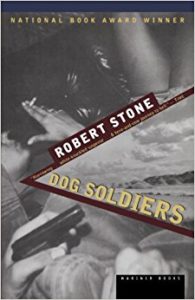 This novel about America after the Vietnam War must have seemed more profound and insightful in the late 70’s. Now it seems worn and clichéd. Converse, a hard-bitten foreign reporter in Saigon buys three keys of heroin and attempts to smuggle it back to the U.S. and that’s his retirement plan.
This novel about America after the Vietnam War must have seemed more profound and insightful in the late 70’s. Now it seems worn and clichéd. Converse, a hard-bitten foreign reporter in Saigon buys three keys of heroin and attempts to smuggle it back to the U.S. and that’s his retirement plan.
The opening scenes are pretty good, lots of humid sweating, dank concrete rooms, incessant smoking and surrounding paranoia. I could feel for the character, thinking that while Vietnam was a stinking hellhole, there was opportunity: drugs were ridiculously cheap, so for a man without a moral compass or even a rational strategy for living, his scheme might have seemed like a kind of salvation.
But the plan, and the story go down the tubes when he recruits a partner, Hicks, a tough, know-it-all merchant marine sailor (whatever that is). The partner will actually transport the dope home. But when he gets to Converse’s wife, Marge, who is supposed to pay him for the drugs, he is almost captured by the law and narrowly escapes with Marge. Was he double-crossed by Converse?
After that, the story is a long chase, as Hicks and Marge are pursued by law enforcement and by Converse. Along the way the reader is treated to a dark view of post-Vietnam culture in the so-called hippie counterculture, full of drugs, sleaze, filth, addiction, and crime.
The story was made into a movie starring Nick Nolte, Who’ll Stop the Rain (1978), which was not a bad movie, way better than the novel. The movie cut the long, moralizing reflections of the narrator, mouthed by Converse, about how America has gone to hell. I was on the margins of the counterculture during that time (not the hard drug culture, but the politically engaged hippies), and that’s not how I remember it. The whole point of hippie culture was to express certain values, of individual freedom, anti-industrialization, anti-government, and especially anti-plutocratic capitalism. We were not all Charles Mansons.
Maybe it was different in the hard drug world, how would I know, but then that’s the story stone should have stuck to and kept his moral agenda to himself. He does not actually address the serious social changes that were under way in the country, but only whines about them. I did have a little sympathy for Converse, trying to make sense out of a country he didn’t recognize anymore. The changes were many, and fast (Nixon quit the presidency in 1974).
In the last half of the book even the chase becomes boring and predictable, so it doesn’t even succeed as a kinetic thriller. Nevertheless, it managed to win the National Book Award in 1975, so the logical conclusion is that its characters and its tale have not aged well.
Stone, Robert (1973). Dog Soldiers. Boston: Houghton-Mifflin. (342 pp.)
